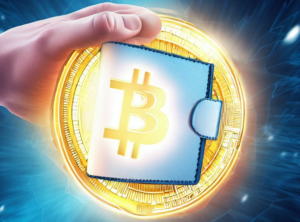The digital revolution has indeed left no stone unturned, and the most distinctive particle in this transformation is none other than cryptocurrency. Now, suppose we delve deeper into this rapidly advancing crypto world, shifting our focus not just on the digital currencies themselves, but the platforms that securely hold them– the crypto wallets. What is their role? How are these overlooked digital purses helping to shape the peer-to-peer transaction future?

Empowering Decentralized Transactions Through Crypto Wallets
Crypto wallets are fundamental tools that empower decentralized transactions, underlining the revolutionary aspect of blockchain technology. They bring transparency, security, and autonomy to users by allowing them to control their digital assets without needing intermediaries like traditional financial institutions. These wallets store cryptographic keys that grant access to cryptocurrencies, making peer-to-peer transactions reliable and easily trackable on a public ledger.
Blockchain’s decentralized nature combined with cryptographic security makes these transactions tamper-proof, building trust among users. Crypto wallets empower users by providing seamless cross-border transaction capability, making them attractive tools in a global economy. They bypass traditional banking system limitations such as transfer fees, delays, and borders, particularly benefiting developing nations whose citizens may not have conventional banking access.
Crypto wallets can store multiple cryptocurrencies, giving users the flexibility to transact in their preferred digital currency. Users can easily convert crypto assets, manage portfolio performance, or invest in emerging cryptocurrencies.
Crypto wallets facilitate ‘smart contracts’, automated, self-executing contracts with the terms of the agreement directly written into code, providing further transactional autonomy to users.
However, with great power comes great responsibility. Crypto wallet users must be cautious; if private keys are lost, so is access to digital assets.
The integration of crypto wallets is also increasingly seen in various industries for its advantages. From e-commerce platforms enabling crypto payments to decentralized finance (DeFi) applications, the impact is widespread.
Thus, crypto wallets, through their capability to carry out decentralized transactions, signify a fundamental shift in how we view and use ‘money’. As financial ecosystems evolve, the role played by crypto wallets in shaping the economy will only continue to grow. Crypto wallets are, hence, not just tools for holding digital assets, but catalysts for the cryptocurrency revolution and for a reimagining of global financial systems.
Enhancing Privacy and Security in Peer-to-Peer Transactions
Enhancing privacy and security in peer-to-peer (P2P) transactions is a growing concern in the digital era. With the exponential rise in technology like blockchain, cryptocurrencies, and digital wallets, P2P transactions have become commonplace. These transactions allow a direct exchange of funds or data between two parties without the need for a central authority. However, this decentralization brings along certain risks to privacy and security.
For privacy, typical P2P transactions reveal too many data points about the sender and receiver, thereby exposing individuals to potential breaches. Ensuring anonymity and secrecy of personal information within these transactions is crucial. Techniques such as zero-knowledge proofs, ring signatures, or cryptographically secure pseudonymous identities can be used to enhance privacy.
On the other hand, security in P2P transactions involves the safety of the assets being transferred and the reliability of the transaction itself. This can be compromised through scams, frauds, or direct attacks on the network. Secure transaction protocols, encryption techniques, multi-signature wallets, and two-factor authentications are vital to preventing such breaches.
The implementation of advanced technologies, such as Artificial Intelligence and Machine Learning, can provide automated, real-time detection of suspicious activities or anomalies, thus adding another layer of security.
Trust also plays an immense role in P2P transactions. Systems like reputation-based trust management can encourage honest behavior among users. Also, sophisticated blockchain systems like smart contracts have embedded trust as they execute only when certain conditions are met.
All these measures collectively contribute to enhancing privacy and security in P2P transactions. However, education and awareness about safe digital practices among users are equally important. This ensures the technology’s widespread acceptance while creating a secure, transparent, and efficient environment for P2P transactions.

Innovations and Challenges: Crypto Wallets’ Impact on Peer-to-Peer Ecosystem
Innovations in cryptography have revolutionized the digital world, particularly the financial ecosystem. The advent of cryptocurrency and its subsequent integration into the peer-to-peer(P2P) ecosystem have presented an array of opportunities and challenges.
Cryptocurrency wallets, or crypto wallets, are digital tools that hold the users’ public and private keys, allowing them to interact within the blockchain network, carry out transactions, and monitor their balance. These wallets have a profound impact on the P2P ecosystem.
Innovation-wise, crypto wallets have provided an unprecedented level of transactional flexibility and freedom. They have made it possible for users across the globe to transact directly, bypassing traditional banks or financial institutions. This decentralized nature of transactions has resulted in faster, cheaper, and more secure transfers. Crypto wallets have also led to financial inclusivity, offering banking solutions to unbanked or underbanked populations. They enable users to store, trade, and manage their digital assets, paving the way for financial sovereignty.
Yet, accompanying these innovations are challenges. Crypto wallet users often face significant security risks. Since transactions made are irreversible and anonymous, they can be exploited for illegal activities. Cyber threats like hacking and phishing attacks further exacerbate this issue. The complex nature of crypto assets and crypto wallets may also be intimidating to new users, slowing down the adoption rate. Moreover, the lack of regulations and legal recognition for cryptocurrencies in many countries poses a significant obstacle.
Crypto wallets have drastically transformed the P2P ecosystem, bringing several enhancements but also challenges. They have democratized financial transactions but raised concerns over security and regulation. As this technology continues to evolve, one can expect a more refined and secure infrastructure that strikes a balance between the free flow and control of digital assets.